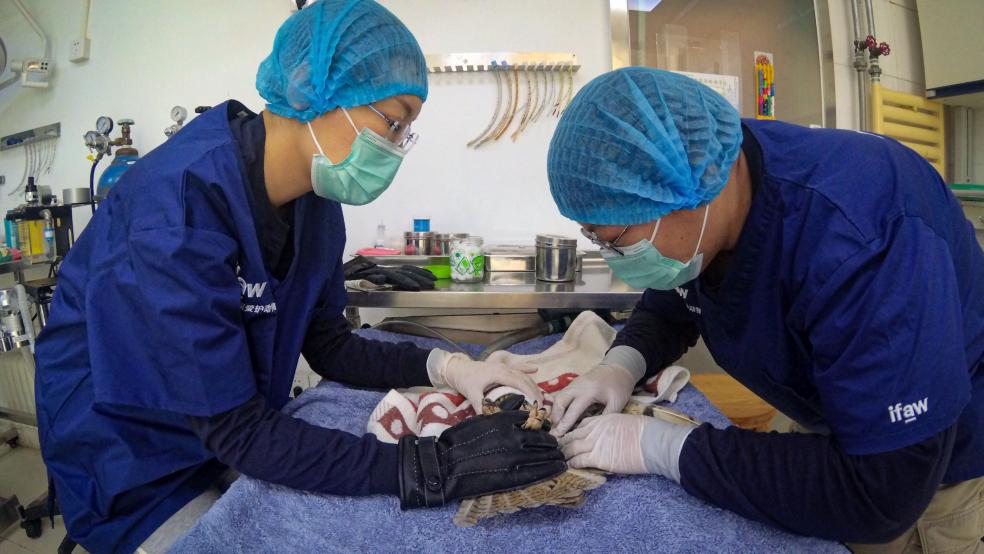
TV vet leads castration debate to help shift UK’s ‘neuter as standard’ mindset
Leading UK vet, James Greenwood, has spoken out today (Monday) to back calls to change widespread policies that see neutering dogs as a standard procedure amongst pet owners.
The UK has the highest canine castration rate in Europe with it traditionally viewed in the same way as vaccination and parasite control, and as a way of controlling behaviour and over-population. But according to television vet, James Greenwood, there needs to be a shift in public perceptions that neutering can be a quick fix for some of these challenges.
Greenwood, who has worked in the industry for 15 years, believes there should be more discussion with pet owners around their motivation for surgical castration, and more awareness around non-invasive options – supporting the shift in narrative which is currently taking place within the profession.
It is common for dog owners to view neutering as standard practice, while new research carried out by Opinium shows that more than half of owners are unaware that alternative methods exist (55%). When quizzed on their thoughts and feelings towards surgical castration, a quarter of owners (24%) felt it was necessary to control a dog's 'unwanted behaviour', with 27% believing 'the sooner it's done, the better for the dog'. A slight concern was that one in ten felt they would be judged if they did not castrate their dog – claiming there was a social stigma attached to having an unneutered dog (10%).
"Neutering is not 'wrong' - but as studies and evidence grow, perhaps we should be looking at alternatives to surgical castration, either by working with behaviour specialists or by exploring medical castration which is temporary and reversible," says James.
He adds: "There is a growing debate around whether routine neutering, especially in male dogs, is necessarily the best option in terms of their health and behaviour. With leading charities such as the Dogs Trust and the RSPCA now lending their voice to the discussion around alternative methods, we need to help dog owners navigate these issues so they can make informed choices for their pet and avoid confusion.
"We know that owners want to do the right thing for their dogs, and by driving greater awareness of all options on the table, we can help them to make the right choice for their pet."
In the UK, the World Small Animal Veterinary Association has recently revised its guidelines suggesting that surgical castration should not be seen as standard best practice for every dog. This follows a live debate hosted by the British Veterinary Association, the leading vet association in the UK, at the London Vet Show which challenged vets to consider each dog and owners' circumstances and move away from a 'one size fits all' approach. It also brought up the conversation around making sure dog owners consider all the options before making a permanent decision in surgical castration.
The UK is starting to follow its counterparts in the US and parts of Europe who have published studies showing that castration isn't necessarily the best method for solving behavioural issues, and in some cases could do more harm than good. In the US, some studies suggest neutering a dog under the age of six months could increase their risk of joint pain, cancer and obesity.
The Opinium study of 655 dog owners suggested greater awareness around medical castration could be helpful – with a fifth saying they have heard of it but are unsure of what is involved (19%).
Medical castration works by inserting an implant under the loose skin on a dog's back, which slowly releases a substance called deslorelin that suppresses their fertility hormones to make the dog temporarily infertile. James believes this could be a good way to 'try before you buy' before opting for irreversible surgical castration to see how the dog reacts.
When asked what would make dog owners consider medical castration over surgical castration, recovery time came out as the top influencing factor, followed by if they felt it was the right option for their specific dog and ease of the process (31%, 31% and 28% respectively).
James Greenwood is offering the following advice to dog owners when considering castration:
- Have a discussion with your vet as to whether this is the best route for your dog. There is no one size fits all model and what will suit one dog, won't necessarily be right for another.
- Consider the dog's current health and age. Young dogs' benefit from reaching sexual maturity (puberty) before surgical castration and older dogs or those with certain health conditions might benefit more from a less invasive option.
- If the primary goal is addressing behavioural issues, you might want to discuss this with your vet as there may be other ways of achieving this such as referral to a clinical animal behaviourist, for example, as castration may even make certain behaviours worse.
- Discuss long term implications with your vet. They will provide insights into how different options may impact the dog's overall health, behaviour and lifespan.
- Each dog is unique and therefore the approach should be tailored to their specific characteristics and needs.
To find out more about medical castration and advice on whether it's the right option for your dog, please contact your vet for more information.







